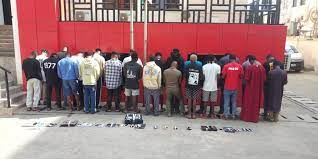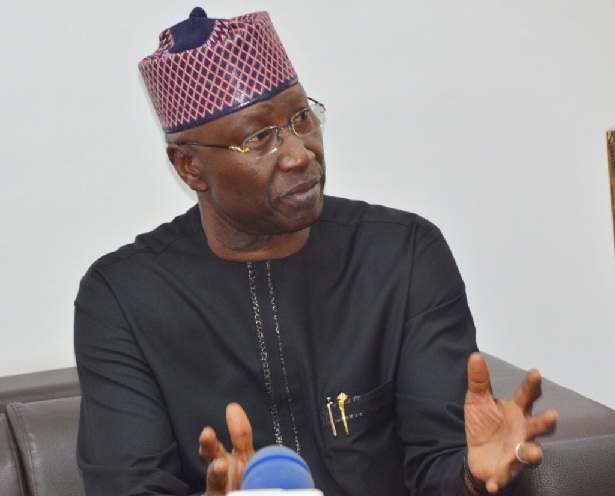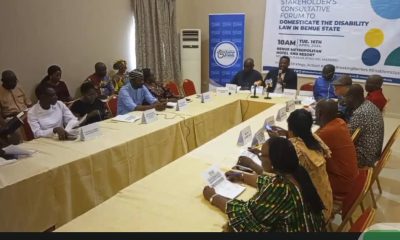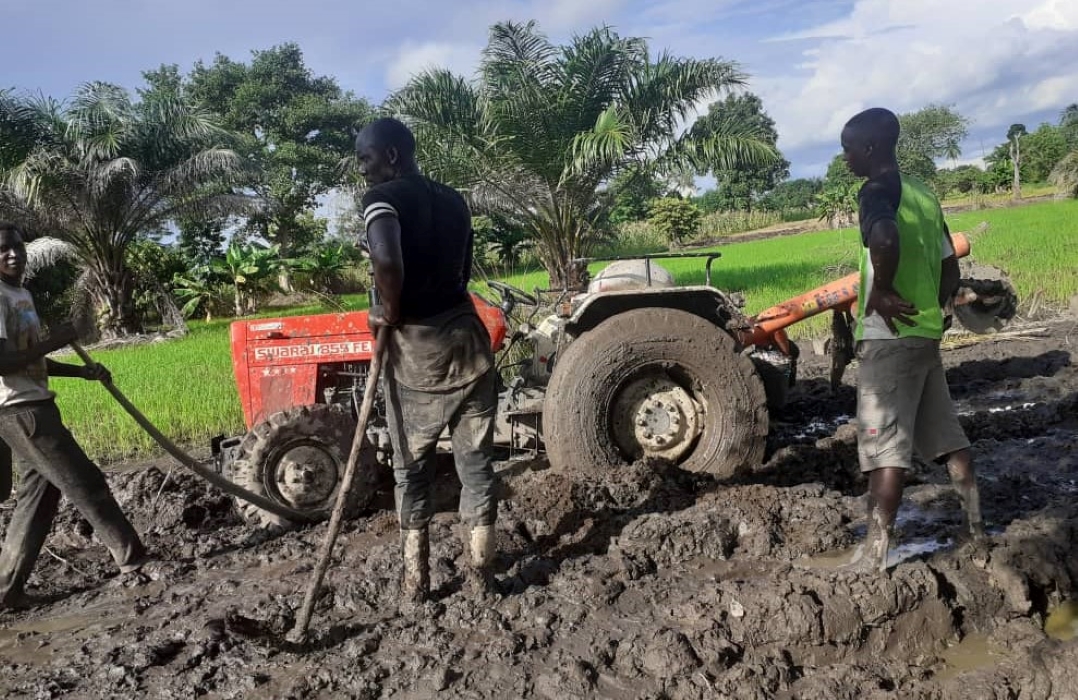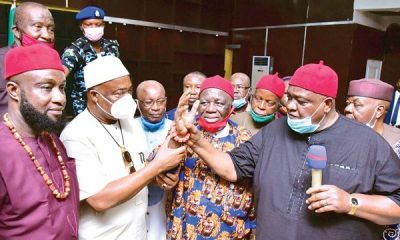FEATURES
Buhari Writes Nigerians on COVID-19

Over the last few days I have received extensive briefings on the state of the nation as it relates to the Covid-19 pandemic, from the relevant Federal Government agencies as well as the Lagos State Government.
Accordingly, I approved the following:
The immediate release of a 10 billion Naira grant to Lagos State, which remains the epicentre of the Covid-19 outbreak in Nigeria.
This grant will enable Lagos State increase its capacity to control and contain the outbreak, while also supporting other States with capacity building.The immediate release of a 5 billion Naira special intervention fund to the Nigeria Center for Disease Control (NCDC) to equip, expand and provide personnel to its facilities and laboratories across the country.
The Nigerian Air Force is already making its fleet available to the Presidential Task Force on Covid-19, to enable a better coordinated and more effective response across the country.
To protect our homeland from external exposure, I directed the immediate closure of our International Airports and Land Borders for four weeks in the first instance, to enable us put up the appropriate policies, processes and infrastructure to cope with suspected and confirmed cases at home, without risking a compounding of the situation with more imported cases.
The inconvenience caused by these flight and travel restrictions to our fellow citizens abroad who want to return home is regrettable, but it is necessary for the greater good, and I thank you all for your understanding and cooperation.
I have also directed that only cargo vessels that have been at sea for more than 14 days be allowed to dock in our ports, after the crew have been tested and confirmed disease-free by the Port Health Authorities. This 14-day restriction however does not apply to vessels carrying oil and gas products as by their nature, there is minimal human contact.
We have also suspended the movement of commuter trains to limit the spread of the virus to other parts of the country.
I have directed the NCDC to draft all its recent retirees back into service to beef up our manpower as we respond to the pandemic.
Furthermore, all NCDC staff and experts who are away on training or international assignments are to return immediately. Already the Nigerian Air Force (NAF) are conducting an evacuation mission to bring back some of our specialists in Central Africa, to enable them support the national response.
I commend the monetary policy authorities for their financial intervention to support our entrepreneurs and companies as we go through this difficult time. We are also looking at fiscal measures to minimise the negative impact of this pandemic on the livelihood of millions of Nigerians.
As you are aware we have begun the process of reviewing the federal budget. We shall communicate our fiscal interventions once the budget review process is concluded.
In the meantime, I have directed the Minister of Industry, Trade and Investment, to work with the Manufacturers Association of Nigeria, to ensure that all production of essential items such as food, medical and pharmaceutical products continues unhindered.
We are engaging our international friends and partners to share knowledge and to seek their support in our response to the pandemic. We are grateful for the show of support thus far – we have already started receiving goods and supplies intended to help us scale up our efforts.
Let me specially thank and commend all of the hard and heroic work being done by our medical personnel, the NCDC, Port Health Authorities, Security Agencies, State Governments, and all ad-hoc staff and volunteers.
I urge all Nigerians to be mindful of those among us who seek to spread panic and misinformation, and sow confusion at this time. We must all pay attention only to the relevant government agencies working day and night to make accurate and useful information available to the public.
I will also ask all of us to strictly obey all public health guidelines and instructions issued by the Federal and State health authorities, regarding personal hygiene and social distancing. These guidelines will be updated from time to time as new information and treatments are obtained.
In the meantime, I want to assure all Nigerians, that the Federal Government remains committed to protecting all Nigerians. We seek your full support and cooperation as we go through this very difficult time. Together we will triumph over this pandemic.
*President Muhammadu Buhari*
26/03/2020
FEATURES
Bobrisky, Naira Abuse and Matters Arising

In February 2024, the mass media was awash with reports of the arrest of Bassey Idio for currency racketeering by operatives of the Uyo Zonal Command of Economic and Financial Crimes Commission (EFCC).
The 59-year-old ‘naira trader’ was apprehended following intelligence and surveillance revealing his illicit cash transactions involving both local and foreign currencies.
He was found selling N700,000 new Naira notes, comprising 12 bundles of N500 notes totaling N600,000, and a bundle of N1000 notes amounting to N100,000.
Idio, later confessed to the crime and was convicted.
Before then, in a widely circulated video, Federal lawmaker Ibrahim Abuna was seen distributing money to a crowd presumed to be his constituents.
Abuna was representing Mafa, Dikwa and Konduga federal constituency of Borno inthe House of Representatives.
He demonstrated his generosity by tossing money from a balcony, disregarding the potential risk of a stampede as people fought to catch the airborne naira notes.
The recipients consisted of young men and women, as well as elderly persons.
Sadly, no arrest or conviction was made since 2021 when the video was made.
On daily basis the Abuna scenario is repeated in different parts of the country as celebrities and politicians try to outdo one another as they engage in money spraying at social events and even political gathering.
Recently, there was a dramatic twist in this otherwise “normal” behavior among Nigerians as a Federal High Court in Lagos sentenced Idris Okuneye ‘!Bobrisky’, a popular crossdresser, to six months in prison for naira abuse.
Justice Abimbola Awogboro, popularly known as Bobrisky, who was prosecuted by the EFCC, was jailed as a deterrent to those that may engage in naira abuse.
The judge also said that Bobrisky should use his influence to teach people about legal money practices.
He said Bobrisky’s offence is contrary to, and punishable, under Section 21(1) of the Central Bank Act 2007.
Naira abuse has been illegal in Nigeria for a long time, but spraying naira notes or throwing its bundles during social events has been a tradition in Nigeria for many years but unfortunately those in indulge in them have not been brought to book under the Act.
The Act recognses naira abuse to include actions like throwing, stamping, engraving, selling, and mutilating the currency. They carry a penalty of a ₦50,000 fine or six months in prison.
According to the Act, tampering includes impairing, diminishing, or lightening coins or notes, as well as defacing them through stamping, engraving, mutilating, or other forms of deliberate abuse.
It notes that spraying, dancing, or stepping on the naira during social occasions or otherwise is considered an abuse and defacing of the currency, punishable under this Act.
A financial expert, Mr Rilwan Afolabi, says the Act aims to protect the integrity and value of Nigeria’s currency by imposing strict penalties on those who tamper with or abuse it.
According to him, by defining various forms of tampering and abuse, including common practices like spraying or dancing on the naira during social events, the Act seeks to deter such behaviours land promote respect for the currency.
“The inclusion of penalties for hawking, selling, or trading in Naira notes further reinforces the seriousness with which the law treats any actions that could undermine the currency’s stability and legitimacy.
“Overall, the Act reflects the CBN’s commitment to maintaining the integrity of Nigeria’s monetary system and ensuring public confidence in the national currency,” he said.
However, many people think the punishment meted to Bobrisky was too harsh and want leniency, while others suggest community service for non-violent crimes like this.
Social activist, Aisha Yesufu, has criticised Bobrisky for admitting guilt to the charge of naira mutilation.
In a write-up on X, formerly known as Twitter, Aisha wondered why Bobrisky quickly admitted guilt.
“Who advised him to plead guilty?”, she screamed, while raising concerns about how spraying money could be equated to mutilating money and why the law is selectively enforced.
She added: “Worst case scenario, I would have advised him to plead ‘No Contest.’
Yesufu raised more posers: “If spraying money is considered mutilation, then what about politicians throwing money at people?
“Mutilation and spraying money how are they the same? Did Bobrisky pick a scissors and started shredding the Naira
“We just have a jungle where anything goes because some people’s morality is offended.
“If Bobrisky has crimes he has committed, prosecute him on those and not this selective prosecutions.”
Also reacting, Deji Adeyanju, a lawyer and social activist, expressed concern over the six-month sentence handed to Bobrisky.
The sentence, delivered without the option of a fine, has raised questions about the severity of punishment for what some perceive as a cultural practice.
While acknowledging the importance of upholding the law, Adeyanju highlighted Bobrisky’s status as a first-time offender and his pledge to utilise his platform to raise awareness against Naira mutilation.
He urged the courts to consider the cultural context surrounding such offenses and emphasised the need for extensive public sensitisation before prosecution.
The issue of selective enforcement was also raised, as Adeyanju questioned why he was singled out for prosecution when others were reportedly engaged in similar acts during the event in question.
He cautioned against the perception of bias in law enforcement and called for a fair and impartial approach to justice.
In light of these concerns, Adeyanju proposed an alternative approach to handling such crimes as Naira mutilation, advocating community service as an ppropriate form of punishment.
He reaffirmed his commitment to upholding the rule of law and protecting human rights while urging security agencies to consider alternative measures for addressing such offenses.
Adeyanju said that the ongoing debate surrounding Bobrisky’s sentence underscored broader discussions about cultural practices, law enforcement and the balance between tradition and legal compliance in Nigerian society.
As stakeholders continue to weigh in on the matter, it remains to be seen how authorities will address the complexities surrounding Naira mutilation and similar offenses in the future.
Also, they call for comprehensive campaigns on the importance of preserving the integrity of naira.
Such initiatives, they say, could help instill a culture of respect for the currency and discourage behaviours that undermine its integrity and value. (NANFeatures)
FEATURES
President Tinubu at 72: Celebrating a Life in Forward Motion

By Keem Abdul
He is 72 on Friday, March, 29, 2024. But in a nod to the current mood across the nation (occasioned by the hardship and insecurity in the land) President Bola Ahmed Tinubu has said he wouldn’t be celebrating that auspicious day.
Instead, according to a release from his media office, he has told his friends, well-wishers and associates to donate to charity rather than spend valuable resources placing goodwill messages and advertorials in print and electronic media outlets to mark the day.
The president, according to the release made particular reference to the tragic killing of a number of soldiers and police officers in Delta State, as well as the serious security breaches by criminal elements in various parts of Nigeria (which has led to an unacceptably high toll of death, injury and loss of property) as reasons why a celebration at this time would be grossly inappropriate – if not downright insensitive.
In place of a celebration, Tinubu says he would use the day to reflect and re-dedicate himself to the task of building a more stable, secure, prosperous and united Nigeria – in line with his mandate as the leader of the commonwealth, namely, to make life better for all her citizens. He, however, acknowledged as some sort of a birthday gift, the recent release of the students kidnapped some weeks ago in Kaduna and Sokoto States. But a gift of far greater import, he added, would be the emergence of a more stable, more secure, virile, prosperous and united Nigeria.
That being said, though, even as the President reflects on his life’s journey so far and his ascendance to the highest office in the land at this time, many Nigerians and even non-Nigerians will also be pondering the phenomenon called Asiwaju Bola Ahmed Tinubu, GCFR, the combination of qualities and attributes (and the unique set of circumstances) that have brought him to this moment in his life and in the evolution of the Nigerian nation.
It is hard to measure the essence of a life as multifaceted and dynamic as that of the man Bola Tinubu. Suffice it to say – as those who know him well have repeatedly done – that he remains an enigma. That description of one’s essential character may be a cliché, but in the case of Asiwaju Bola Tinubu, it is all too true.
Since the advent of Nigeria’s current democratic dispensation in 1999, Asiwaju Tinubu has become perhaps the most constant factor in defining the outcomes of electoral contests in the country – and even more so in his home state of Lagos. His almost 100% success rate in this regard is not by accident. A great writer once said that the heights great men attained are ‘not by sudden flight.’
Tinubu’s success as a politician testifies to his capacity for deep reflection and prompt action in equal measure.
On one hand, he has always been deliberate and intentional in the planning and execution of his strategies, doing nothing that is superfluous or forced. His caution, in other words, is matched by his ability to execute his plan – in a way that meshes into the whole vision which he has crafted for himself and the people that he leads. Every step he takes has been methodical and fills a gap in his overall quest for the enthronement of a continuous cycle of progress and prosperity within his sphere of influence.
He is a man with extra ordinary sensory perception who’s in tune with his inner self thus making him understand that there’s no force on earth strong enough to restrict the procession of promises of God. His perception wasn’t tainted by experience of betrayals rather he recognised that’s there’s no betrayal that he went through that didn’t work together for his good, that there’s never a dagger thrown at him that God didn’t convert to a stronger him.
1999 to date has been a time of almost constant struggle for Asiwaju Tinubu. His battles with the federal government, and with the internal opposition in Lagos, are too well-known to recount here. But the question is: Why does he fight so hard, For whom, or what, is he fighting? Wealth? Power for power’s sake? Fame and recognition? If so, why does he still keep fighting NOW, even AFTER having acquired these things in some measure?
One unmistakable answer to these questions – no matter one’s background or political and religious affiliation – would be that Asiwaju Tinubu is a man driven, not just by personal ambition or group interest, but by the altruistic desire to confront the forces of economic underdevelopment and social rot, no matter what it may cost him personally. His willingness to go all out in pursuit of his goals and convictions – even if it means sacrificing himself for others and the society as a whole, is truly remarkable.
In the rough-and-tumble of Nigerian politics where elections are usually a clash of weapons rather than a contest of ideas and ideologies, and most politicians are devoid of both, Tinubu’s principles and idealism can be hinged on the simple South African maxim of “Ubuntu” (I am because we are).
This understanding of the value of an unshakable bond between brethren is what has shaped the dynamics of Tinubu’s actions and engagements with other stakeholders. On more than one occasion, he has professed a desire to build the community; the people in it and the institutions and traditions that govern them – based on his belief that once a society is healthy; all elements within it will be significantly impacted.
It is also the reason he has built the careers of so many other leaders, men and women who have gone on to become political giants in their own right since 1999 – again, based on his belief that various people with diverse capacities in various places can coalesce to build a better and stronger society. No matter what his detractors may say, Tinubu’s investment in the lives and political fortunes of others is far from personal or individualistic, far from it.
Many distinguished persons in the society are the products of this investment. The results so far are a demonstration of the fact that the power to make a difference in the lives of Nigerians is within his grasp – and in our grasp if we all make an effort.
Much has been said about the Jagaban’s unique combination of fearlessness and humanity. Though he never goes out of his way to court controversy, he never runs away from one, especially when he has restrained himself and sought all ways to seek rapprochement with the other party. His capacity for compromise and respectful dialogue is how he has been able to build a team of highly dedicated men and women around himself.
As his close associates mark his 72 years on earth (one way or another) or join him in his reflections on the state of Nigeria and his mandate to lift the country and its people out of our present quagmire, it’s the prayer of all right thinking and patriotic Nigerians that the good Lord who has seen fit to allow Tinubu to occupy that lofty position will keep him in good health and preserve him so that he can fulfil the purpose for which God brought him into existence, that God will strengthen him, equip him with the physical energy and profound wisdom, understanding and knowledge that he needs to drive the vision that transformed Lagos into a globally-competitive megacity and the 5th largest economy in Africa.
His promise to replicate that transformation on a national scale is still on track, and with the help of God and the committed cooperation of the Nigerian people, the mission will be fulfilled.
Happy birthday, Mr. President!
May your strength be Renewed. God bless Mr. President. God bless Nigeria.
Keem Abdul, publisher and writer, hails from Lagos. He can be reached via +2348038795377 or Akeemabdul2023@gmail.com
FEATURES
FCT Residents Squeak over Food Prices Soar, FG urges Patience

Nigerians in the Federal Capital Territory (FCT) are concerned over the continued instability and increase in the cost of essential goods and services in the city centre.
Headline inflation rate released by National Bureau of Statistics (NBS) in February showed that inflation rate surged to 31.
70 per cent, with food inflation hitting a staggering 37. 92 per cent.These inflation pressures have led to significant volatility in the prices of essential commodities, posing a challenge to the livelihoods of many residents.
Inflation is a decrease in the purchasing power of money, reflected in a general increase in the prices of goods and services in an economy.
It is typically a broad measure, such as the overall increase in prices or the increase in the cost of living in a country.
The spike in food inflation in Nigeria has made it increasingly difficult for many families to afford essential food items, leading to concerns about food security and access to nutritious meals.
The rising cost of transportation has added to the financial strain on residents, making it harder for workers for instance, to commute to work and access basic services.
Due to these developments, there is a pressing need and call for measures to address the underlying causes of inflation and ensure price stability for essential goods and services in the country.
According to residents, it is essential to implement policies that can effectively address the inflation challenge and stabilise prices.
They, therefore, urge relevant authorities and policymakers to take steps to mitigate the impact of inflation on the daily lives of the people.
They further urge that efforts that would enhance food security and support vulnerable households should be prioritised to mitigate the adverse effects of inflation on access to food.
Mrs Anthonia Yusuf, mother of three, expressed her distress over the soaring prices of food items, saying it is becoming increasingly difficult to put food on the table for her family.
“The prices of basic food items like rice, beans, and cooking oil have almost doubled in the past few months. I am deeply worried about how we will cope if this trend continues.
“ As a mother, I feel for children out there without parents. I cannot even imagine how they are able to fend and survive with the increased cost of living we are experiencing,’’ she said.
Also, another resident, Mrs Patience Akpa said: “Thse days, I do not attach prices to the list of items I intend to buy form the market because I cannot guarantee that the price would still remain the same.
“This is not good for us, we cannot even afford to plan because we do not know what tomorrow holds or will bring to our door-step.
“ We pray and hope the government and people in charge of policies will look into this unstable and increasing cost of living in the country.’’
Similarly, Mrs Favour Akputu said :“ my family is now living one day at a time and our only hope is in God whom we are trusting will continue to provide our needs.
Mr Ibrahim Usman, a civil servant, highlighted the ripple effects of the inflation on transportation costs.
“Commuting to work five days in a week has become a financial burden due to the rising transport fares.
“With the increasing cost of living, my salary is no longer sufficient to cover these additional expenses, thus, something needs to be done to address this issue speedily,” Usman said.
Similarly, Ms Ngozi Okoro, a small business owner, shared her concerns about the impact of inflation on her enterprise.
Okoro said as a retailer, she had witnessed a decline in customers as they struggled to cope with the escalating prices of goods.
She said :` This is affecting my sales and profitability, and I fear that if this persists, I may be forced to close down my business because right now I am even managing to cope and stay in business.
“And if that happens, my family will suffer because this business is the only source of income I have to support my husband who his taxi driving barely provides the need of the family.’’
For his part, Mr Moses Osita, a student, underscored the challenges faced by his peers, especially students from low-income backgrounds.
“ Many of my peers are finding it hard to afford meals on campus. The higher food prices have made it difficult for students with limited financial resources to meet their basic needs.
“ This is affecting our academic performance and well-being. If the youths are truly` leaders of tomorrow’, then something needs to be done urgently, because we are currently uncertain of our tomorrow,” Osita said.
Meanwhile, Mrs Fatima Adajime, a retired worker, drew attention to the plight of senior citizens of the country, the retired individuals.
“As a pensioner, I rely on my fixed income to cover my expenses. The steep increase in food prices has eroded the purchasing power of my pension. It is disheartening to see fellow retirees struggling to afford essential items.
“Due to our age, a lot of us suffer one health challenge upon another and the cost of drugs is nothing to write home about, these challenges needs urgent solutions by relevant quarters,’’ Adajime said.
According to Mr Francis Adams, a financial expert, many Nigerians are currently struggling with hardship due to government reforms including the removal of petrol subsidy.
Adams said the depreciation of naira had eroded incomes and savings of many, adding that this had worsened with Nigeria’s increased headline inflation rate recently released by the NBS.
He is, however, optimistic that if well managed, the reforms will yield positive dividends in the future.
He said as Nigerians continued to grapple with the repercussions of soaring inflation,
He urged the government to, in the interim, implement policies that would cushion the effects of inflation on the citizens.
“It is imperative for authorities to take decisive action to mitigate the impact of inflation and ensure the well-being of the populace’’, Adams said.
According to him, the pursuit of price stability is crucial in safeguarding the well-being of Nigerians and fostering a more sustainable and equitable living environment.
President Bola Tinubu has called for patience as his administration navigates the economic situation considered unpleasant by many Nigerians.
“I would like to solicit for understanding and support of Nigerians towards the government’s economic reform programmes inspired by the difficulties involved.
“We are very much hopeful that these policies will yield the desired results in no distant future”, Tinubu said through Prof. Tahir Mamman, the Minister of Education at the 43rd graduation ceremony of Ahmadu Bello University Zaria. (NANFeatures)




